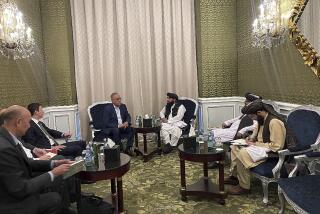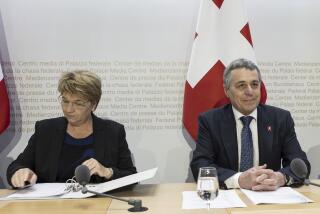Afghan Talks Set for Berlin
- Share via
NEW YORK — Breaking a diplomatic impasse, four major Afghan political factions have agreed to meet with United Nations mediators in Berlin next week in a crucial first step toward building a new government for Afghanistan, U.N. officials announced Tuesday.
The immediate goal of the negotiations is to select about 20 representatives of the different factions who could lead a transitional administration in Afghanistan before the election of a permanent government, U.N. officials said.
“The participants are going to gather over the weekend, and the meeting will start hopefully on Monday,” said Lakhdar Brahimi, the U.N. special envoy to Afghanistan, who will head the gathering.
The talks will include delegates from the Northern Alliance, which controls the Afghan capital, Kabul, and other major cities and considers itself the nation’s legitimate government. Northern Alliance officials said Tuesday that they remain opposed to sharing power with two of the groups invited to Berlin.
The alliance’s political leader, Burhanuddin Rabbani, who was deposed by the Taliban as Afghanistan’s president, dismissed the Berlin talks as symbolic and demanded that negotiations take place in Kabul. His faction, which is dominated by ethnic Tajiks, holds sway there.
But Rabbani’s foreign minister, Abdullah, who belongs to the country’s dominant Pushtun ethnic group, said the alliance backs the U.N.’s call for a multiethnic government.
Brahimi and his Kabul-based deputy, Francesc Vendrell, have been negotiating with Afghan factions for weeks in an effort to secure their participation in a coalition-forging conclave.
“We hope that this will be the beginning we’ve been looking for to end the conflict in Afghanistan and start building new institutions in the country,” Brahimi said Tuesday after a closed-door meeting with the U.N. Security Council.
There will be no Taliban officials at the Berlin meeting. Nor will many smaller ethnic and political groups in the anti-Taliban forces have seats at the table.
“We are very aware that convening these groups would not mean that every single Afghan would feel totally happy, totally represented,” Vendrell said Tuesday in Kabul. “This is not the final step.”
Brahimi had initially proposed convening a broad-based provisional council that would in turn designate administrators of an interim regime in Kabul. But the swift collapse of Taliban rule and the difficulty of securing the participation of leaders from all major ethnic and political factions led him to revise his plans.
“It is harder to select 20 people than 200 people, but he thought that it might be more practical to select the smaller body first,” said U.N. spokesman Fred Eckhard.
The Security Council, eager to have some recognized authority other than the Northern Alliance running Afghanistan, strongly endorsed this streamlined approach during its meeting here Tuesday, diplomats said.
Security Council President Patricia Durrant of Jamaica called the Berlin gathering “an indispensable first step toward the establishment of a broad-based representative government in Afghanistan.”
But representatives of the Northern Alliance made it clear that they are participating in the Berlin meeting under duress and that they have not agreed to the basic outlines of the U.N.’s proposed transition to a new government.
Ambassador Ravan Farhadi, a Rabbani government appointee who remained Afghanistan’s official representative at the U.N. when the world body refused to recognize the Taliban regime, said the Northern Alliance strongly objects to giving a governing role to the so-called Peshawar Convention, a loose coalition of mostly Pushtun leaders in exile in Pakistan, or to Iranian-backed opposition figures known as the Cyprus group. Both were invited by Brahimi to Berlin.
The Northern Alliance says it is willing to work with followers of Afghanistan’s exiled monarch, Mohammad Zaher Shah, who will be represented in Berlin by his former justice minister.
“The Cyprus group and the Peshawar group have no leverage over the affairs of Afghanistan,” Farhadi said in an interview here. “They have not participated in the resistance against the Taliban and [Osama] bin Laden. Peshawar publications sometimes praised the Taliban. It would be very difficult for our side to accept such personalities who favor foreign influence in Afghanistan, either from Pakistan or from Iran.”
Allies of the 87-year-old former king also voiced misgivings about the participation of the two groups. “The process has been taken away from Afghans,” said an aide to Zaher Shah in Rome. “We had the momentum. Then the U.N. changed the locomotive, and we don’t know where it’s going now.”
Zaher Shah, exiled in Italy since a 1973 coup ended his 40-year reign, had secured a pact with the Northern Alliance last month to join forces in a new, broad-based Supreme Council of National Unity under the former monarch’s figurehead leadership. But the Northern Alliance reneged on promises to hold a second meeting and grabbed power in Kabul last week before the proposed council was named.
The alliance also opposes the idea of an international peacekeeping force in Afghanistan, Farhadi said, whether it is composed of European troops or soldiers from predominately Muslim nations. U.S. and U.N. officials have said that multinational forces will be needed to provide security during the establishment of a new regime and to keep the Northern Alliance from imposing unilateral military dominance in the major cities abandoned by the Taliban.
“Sending in foreign troops is OK for getting Bin Laden, but not for these other reasons,” Farhadi said. “I don’t understand the necessity of peacekeeping troops. Kabul is being run in a peaceful way by the Northern Alliance right now.”
With the strong support of Washington, the Security Council has told Brahimi that he need not insist on any specific formula for peacekeeping forces or transitional administrative structures, diplomats here said. Brahimi has indicated he wants maximum flexibility in the Berlin talks, which at least initially will include no observers from the United States or other countries with interests in Afghanistan.
“Our decision is fully to support Brahimi,” said one U.S. diplomat who spoke on condition of anonymity. “We are not going to second-guess him.”
If the Berlin meeting leads to the formation of an interim governing coalition, the U.N. hopes to convene a traditional loya jirga, or grand council, of religious and tribal elders and other Afghan leaders. The grand council would approve a framework for the elections of a permanent government, U.N. officials said.
The U.N. and foreign governments have tried before without success to persuade Afghanistan’s myriad ethnic, political and religious factions to make peace and share power. In 1989, as Soviet forces withdrew after a brutal, decade-long attempt to occupy Afghanistan, seven factions of victorious moujahedeen fighters met to form an interim government.
The meeting included faction leaders, several of whom still wield power in Afghanistan, and about 400 delegates. It was held in Islamabad, the capital of neighboring Pakistan, which has long tried to manipulate Afghan politics to its advantage.
The negotiations disintegrated into a shouting match, and the Afghan faction leaders simply divided government Cabinet posts among themselves and their top aides. Three years later, when the moujahedeen forces defeated the Afghan government left in place by Soviet forces, Rabbani took control.
The factions began to fight among themselves for control of the capital, killing at least 50,000 people, reducing large areas of the city to ruins and setting the stage for the Pakistani-backed Taliban militia to seize power in 1996.
U.N. officials have higher hopes for the Berlin meeting, but the Afghans are skeptical. “We think it will be a very interesting meeting, but it will not be the final meeting,” Farhadi said.
*
Orme reported from New York and Watson from Kabul. Times staff writer Richard Boudreaux in Rome contributed to this report.
More to Read
Sign up for Essential California
The most important California stories and recommendations in your inbox every morning.
You may occasionally receive promotional content from the Los Angeles Times.













